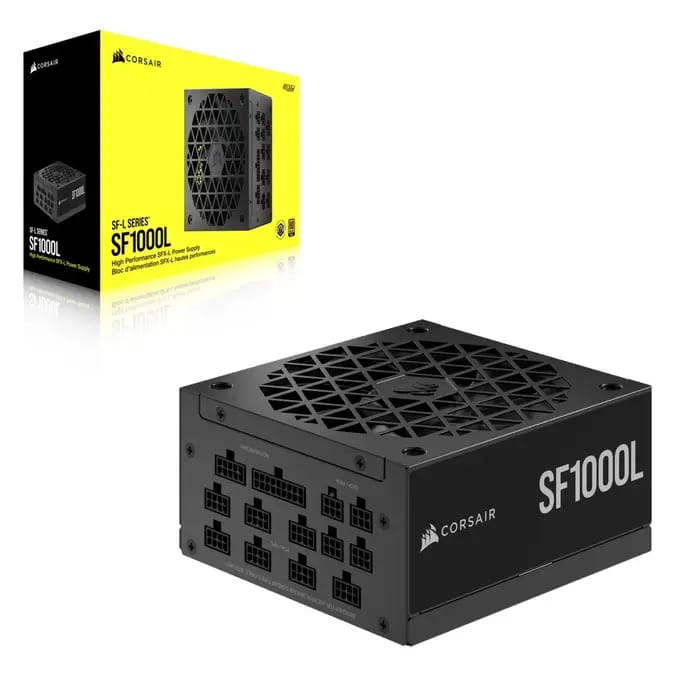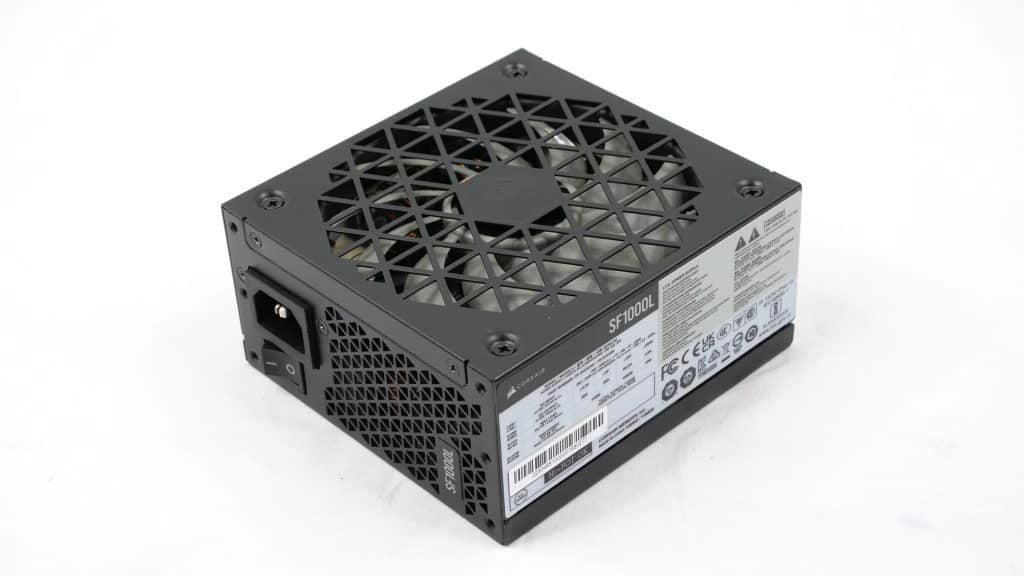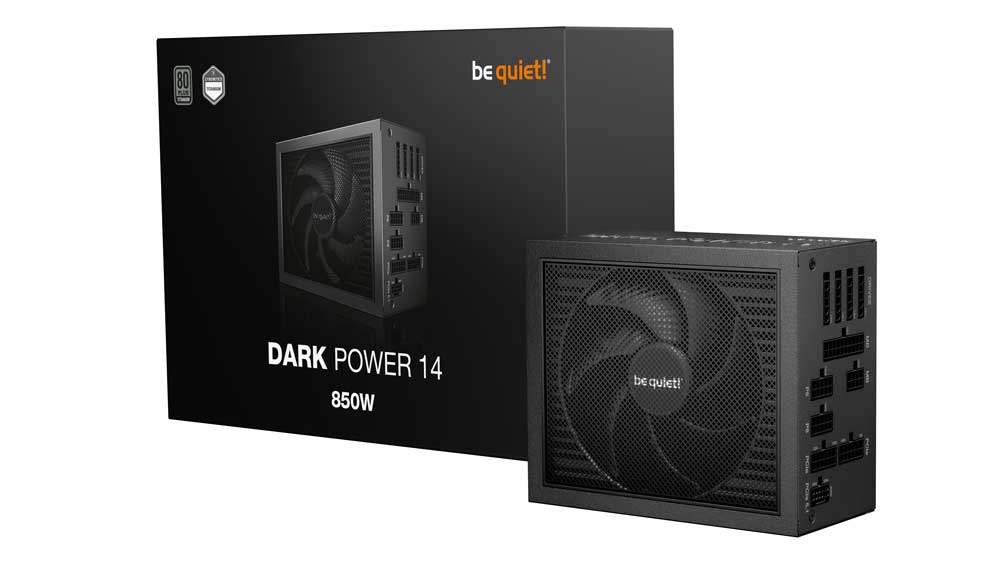The Corsair SF1000L follows the SFX-L form factor, offering top performance, high efficiency and ATX v3.0 and PCIe 5.o compatibility.
Corsair released its first SFX-L units, the SF1000L and SF850L. After the top-notch SF series, the SF-L line arrived, bringing higher capacity and ATX v3.0 and PCIe 5.0 compatibility. In the SF1000L unit, the Cybenetics Platinum efficiency shows the unit’s high efficiency. At the same time, the Cybenetics Standard noise rating doesn’t seem so good when it comes to noise output, but I will analyze this later in the review. Besides the usual connectors, there is also a 12VHPWR set at 600W, so the SF1000L won’t have a problem powering an NVIDIA RTX4090 with a high-end CPU.
With a price of $200, the SF1000L is way more affordable than competing offerings from Asus, Thermaltake, and Silverstone since it is $60 to $100 cheaper! At the time of the review, the ASUS ROG Loki SFX-L 1000W was sold for $270, the Thermaltake Toughpower SFX 1000 at $300, and the SilverStone SX1000 Platinum at $315. I obtained all price information from Newegg.
The Corsair SF1000L is included in my best ATX v3.0 & PCIe 5.0 PSU picks article.
- Manufacturer (OEM): Great Wall
- Max Power: 1000W
- Cybenetics Efficiency: [115V] Cybenetics Platinum (89-91%)
- 80 Plus Efficiency: Gold
- Noise: Cybenetics Standard (40-45 dB[A])
- Compliance: ATX v3.0, SFX-L, EPS 2.92
- Operating Temperature (Continuous Full Load): 0 – 50°C
- Alternative Low Power Mode support: Yes
- Power 12V combined: 1000W
- Number of 12V rails: 1
- Power 5V + 3.3v: 150W
- Power 5VSB: 15W
- Cooling: 120mm Fluid Dynamic Bearing Fan (NR1215)
- Semi-Passive Operation: ✓
- Modular Design: Yes (Fully)
- High Power Connectors: 2x EPS (2x cables), 5x PCIe 6+2 pin (4x cables), 1x PCIe 12+4 pin (600W)
- Peripheral Connectors: 8x SATA (2x cables), 3x 4-pin Molex (single cable)
- ATX Cable Length: 300mm
- EPS Cable Length: 400mm
- 12VHPWR Cable Length: 400mm
- Distance between SATA: 110/115mm
- Distance between4-pin Molex: 110/110mm
- In-cable capacitors: No
- Dimensions (W x H x D): 125 x 65 x 130mm
- Weight: 1.16 kg (2.56 lb)
- Warranty: seven years
- Stree price (excluding VAT): $200
Power Specifications
| Rail | 3.3V | 5V | 12V | 5VSB | ||
| Max. Power | Amps | 20 | 20 | 83.3 | 3 | |
| Watts | 150 | 1000 | 15 | |||
| Total Max. Power (W) | 1000 | |||||




Hello, could you please help me choose a PSU, I would like to avoid getting the “new” type 12+4 connector on PSU (I do not like all that possible melting issues), I like what corsair used to do, having used adaptor instead to plug 2x 8 pin connectors to PSU and 12+4 into the GPU but I can not find a “list” of PSU that do not have 12VHPWR on the PSU physically, but rather use 2×8 pin adaptor instead to power high energy GPUs, could you guide me in the right brand to look at in 1000 W PSUs please?
I would like to clarify since I am not sure my first message is clear enough. I would like ATX 3.1 power supply but the type that uses 2x 8 pin connector to power up the 5070 and higher RTX GPUs, not the “modern” 12V-2×6 (or pcie 5.0 or whatever the new plug is called) on both ends (PSU and GPU).
Some PSUs, like for example Corsair HX1000i does not use the new type connector on PSU side at all – which I prefer after seeing some thermal camera videos of the new cables being way too warm delivering 600 W to 5090s, it rather uses 2x classic 8 pin connector to deliver power to the GPU (GPU cable ends with the new type 12V-2×6 connector).
And other than checking each PSUs individually, I do not know how to tell if it has or has not the pcie 5.0 or 12V-2×6 on the PSU.
Models I found that should not have that are Corsair HX1000i (but that one is a bit costly around 260 usd incl. 20% tax at my location) Corsair RM1000x SHIFT (around 215 usd incl. 20% tax) – it should just barely fit my case, I would need to test and see.
Or I could just forget all that overheated cable info and get FSP Fortron Vita GM 1000 for 135 usd (incl. 20% tax), but then again, “standard” 8 pin connectors are something I would prefer for a PC part that will last me quite a few component upgrades.
I would greatly appreciate your input.
Have a nice day
Super Flower PSUs use proprietary connectors as I remember. And some Corsair units too. I don’t remember all I am afraid but you can easily go through my reviews here and check photos.
Can your reviews add coil whine testing… Certain loads with coil whine Dba test results or something. I found all the Corsair PSUs appear to have some coil whine under load. Asus Loki apparently has as much if not more coil whine. Apparently Seasonic PSUs have less coil whine but a lot of complaints about fan noise (I replace fans in my PSUs) :P. I do like the Corsair PSUs, I build for silence so coil whine under load conditions defeats this goal.
Actually most complain for coil whine in the seasonic Vertex. We do test for coil whine but the fact is that we only get 2 samples per unit. If we notice coil whine we mention that in the reviews.
Another excellent review, Aris – thank you! It’s safe to say that I wouldn’t even consider buying a PSU without your thorough review. I do wonder though, I noticed that the unit is actually Platinum rated according to:
https://www.clearesult.com/80plus/sites/80plus/files/manufacturer-certificate/CORSAIR_RPS0156%20%28CP-9020246%29%20%28SF1000L%29_1000W_SOCE%206912_Report.pdf
Perhaps this was a marketing choice by Corsair, but even so, an odd one!
I’m currently torn between the Corsair SF1000L (noise isn’t a concern as long as the fan does its job), the Thermaltake Toughpower 1000W, and the ROG-Loki. However, I’m hesitant about the ROG-Loki due to reported coil whine issues. If you could only recommend one SFX-L 1000W+ PSU, which would you choose (even if not listed)?
Thanks in advance for your insights!
It is Platinum in Cybenetics, because of the different methodology that it uses compared to 80 P.
I don’t have an Asus Loki review sample so far and this troubles me. Asus marketing in general is so so, rarely sending out review samples.
I would go for the Corsair SFX-L. Currently it is the best option, especially if you don’t care about noise at high loads.
Thank you very much Aris – I’ve gone with the SF1000L!
Glad I helped!